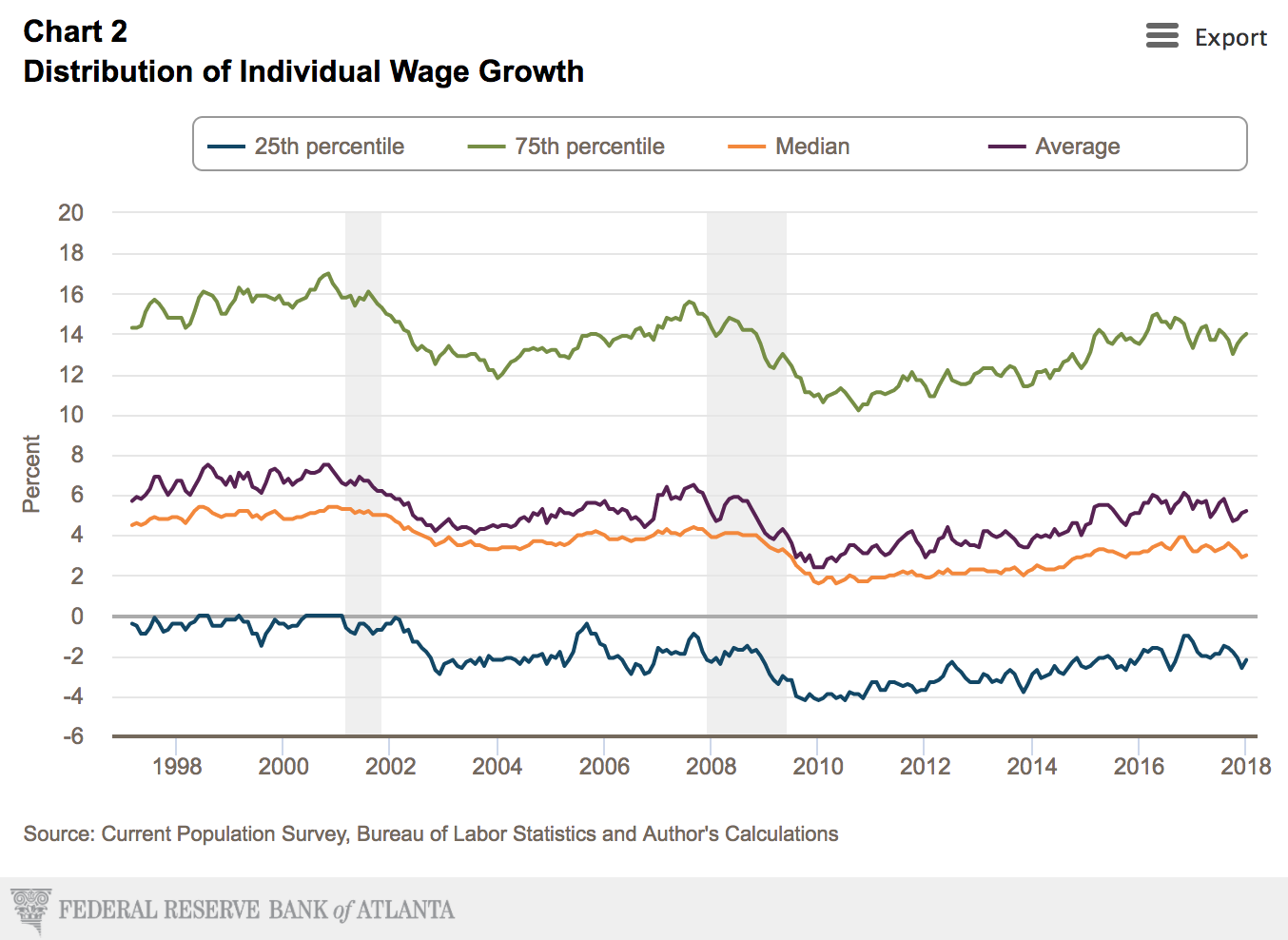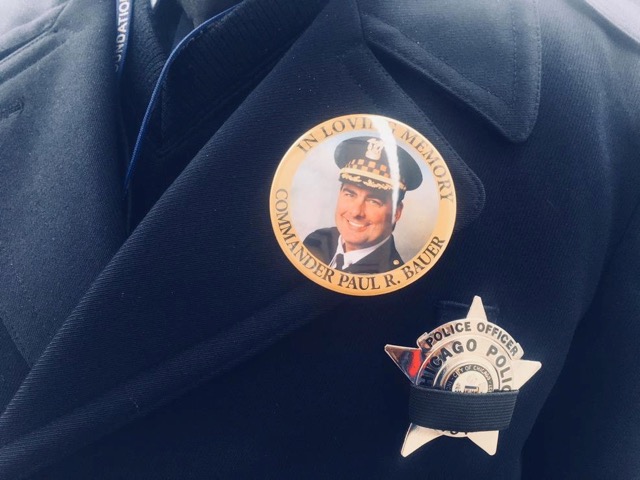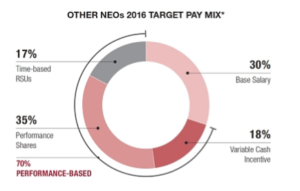
by Kate Evert | Mar 8, 2018 | Compensation, Economy, Wage Increases
“Will I get a raise? How much?” is a question on everyone’s mind at this time of year.
Since January, the press has been full of stories telling everyone to only expect a 3% raise. Well, compensation consultants hate generalities almost as much as statisticians do.
There is a reason that Commonwealth HR Consulting keeps a link to the Atlanta Fed front and center on our resource page. Not only do we think that the Atlanta Fed gets it (using a methodology developed by the San Francisco Fed), but we think this is a wonderful resource for organizations to reference based upon your location(s), labor market(s), and labor force(s).
As for that 3.0% increase? We urge you to take a look at Charts 2 and 3 at the Atlanta Fed’s site. In January, the Distribution of Individual Wage Growth showed:
25th Percentile = -2.2%
50th Percentile/Median = 3.0%
Average = 5.2%
75th Percentile = 14.0%
Chart 3 indicates that 14.9% of the group that the Fed tracks, received a 0% increase.
Some food for thought. Especially if you are an employer who is consistently giving increases to employees who have not upgraded their skills in years … and at the same pace as those employees who possess hot skills, the 14% hot skills. Read More Here

by Kate Evert | Feb 20, 2018 | Leadership
Last Tuesday, February 13, I picked up my cell phone and received this text from a high school classmate:
“One of our classmates (CPD) shot and killed.”
I doubt that there’s an American who hasn’t read about the selfless Chicago Police Commander who was shot and killed in the line of duty a week ago today. Story after story about Paul Bauer emerged from every corner. Even my cab driver told me about how nicely Commander Bauer had once told him to move from a no parking zone. A cab driver saying nice things about a cop! I was in a meeting and a woman was telling me how she’d known him for years, and was stunned to hear he was a commander because of how approachable he was. A friend’s husband was upset because he’d gotten to know him via the coffees he’d hosted for local business people. You couldn’t walk down the street without hearing people talk about Paul Bauer … and these weren’t fellow officers. These were the people he’d sworn to serve and protect.
The sentiment on all of Chicago’s lips: he was just the kind of cop we needed — the sort of role model that the entire force needed and that the entire city needed to see.
Thanks to technology I was able to watch the funeral. His wing man, Mel Roman, said that he understood that “a leader does a million small things.” Another classmate and retired Chicago Police Officer, John Escalante, eulogized his friend of 45 years. Escalante was able to isolate an intrinsic part of his leadership style; the ability to lead out in front, but then “casually work his way back so others got accolades and rewards.”
In the midst of tragedy, John sounded a hopeful note. He told us: “One and a half years after retiring, there’s always going to be … even in retirement, a part of our lives that now and forever will always be partially shaped and defined by our time with the Chicago Police Department. And so for Paul, I take some comfort in knowing and truly believing that there is going to be a Chicago Police Department that now and forever will always be partially shaped and defined by the life of Paul Bauer. And that will be a good thing.”
The city of Chicago has announced that its new police and fire training center will be named the Paul R. Bauer Academy. Do you have someone that so embodies the spirit of your organization and its mission? Read More Here and Here

by Kate Evert | Feb 14, 2018 | Diversity, Equity, Inclusion, Hiring, Human Capital, Recruiting
From my involvement with Best Buddies, I was aware that there were companies who hired people with intellectual disabilities. This story highlights that often these aren’t disabilities. These intellectual differences allow some employees to bring much needed skills to the workplace. Many people on the autism spectrum are better at pattern recognition and attention to detail.
For many years, my colleagues on the organizational development end of the HR spectrum have lamented that the traditional hiring process is flawed by interviewer bias. Companies like Microsoft are using a different way of interviewing people on the autism spectrum, but this is actually better way of screening most candidates and predicting success within a role and a company culture.
“Instead of the traditional job interview focusing so heavily on social skills, the company – Microsoft – has replaced it with a vetting process that lasts for weeks and includes team building exercises.”
Given the current labor shortages in certain areas, I don’t think we can afford to ignore any human capital, or an increase in turnover. It’s taking people on autism spectrum to bring out some of the better practices on the HR spectrum. Read More Here.

by Kate Evert | Nov 16, 2017 | Compensation, Economy, Wage Increases
[vc_row][vc_column][vc_column_text]
On their earnings call recently, Equifax announced that due to their recent cyber breach, the executive team would be foregoing any annual incentive this
year. Read More Here. “Well that’s good I thought. About time some executives owned up, felt the pain, …” But then this little voice in me wondered … how much pain are they really going to be feeling? Is this for real, or just a good story? So I did what any good compensation consultant would do:
I read their proxy.
It turns out that this noble act isn’t necessarily as noble as it first sounded. First, in their comp design, the target annual incentive comprises only 18% of the Target Pay Mix for the Named Executive Officers. Then, if the 2017 plan follows the design of the 2016 plan, 15% of the annual incentive plan is tied to Corporate Operating Revenue and 65% is tied to Corporate Adjusted EPS. Something tells me that the chances of Corporate Operating Revenue meeting expectations this year aren’t very good. And as for Corporate Adjusted EPS,
which they footnote is a non-GAAP financial measure, well why that is a questionable measure in an annual incentive plan is a blog for another day.
Read More Here.

by Kate Evert | Nov 9, 2017 | Economy, Human Capital
While attending the University of Chicago’s Business School (now Booth), I learned a lot about the key principles of capitalism, including the concept of human capital. As an alum, they have turned me onto one of the most interesting forms of organizations that I think exists: social enterprise. I first heard the term social entrepreneurship at a U of C Management Conference in the early 2000s. Then, at the Management Conference in 2010, I saw at presentation that perfectly demonstrated the power of what social entrepreneurship could do: two students, moved by the devastation caused by the earthquake in Haiti, wanted to develop something to immediately improve the lives of women and children on that island. One issue that was not being addressed was their security at night. Using their unique talents honed before coming to Chicago, combined with the lab in social entrepreneurship, these students developed a solar powered light that would float, not sink, and hang easily in makeshift shelters. I came home from that conference energized by what social entrepreneurship can accomplish.
LuminAID went into production, has several products, and starred on Shark Tank.
Given the impetus behind LuminAID’s founding, it’s not surprising that in the aftermath of Hurricane Maria, and realizing that 70% of Puerto Rico was still without power, LuminAID co-founders, Anna Stork and Andrea Sreshta, decided to take action themselves. Anna and Andrea filled a few suitcases with solar lights and chargers (a newer product) and flew to Puerto Rico to bring reusable power to over 300 homes. These solar chargers help charge phones even when there’s no electricity and the built-in lanterns bring light to homes at night. Over 25,000 LuminAID solar lanterns and phone chargers have been sent to Puerto Rico.
So if you get as charged by the concept of social entrepreneurship, or are just looking for a way to help people in Puerto Rico, why not donate $10 to sponsor a light for Puerto Rico? Or, spend $25 and get a solar light for yourself and sponsor one for hurricane relief as well. Read More Here.






